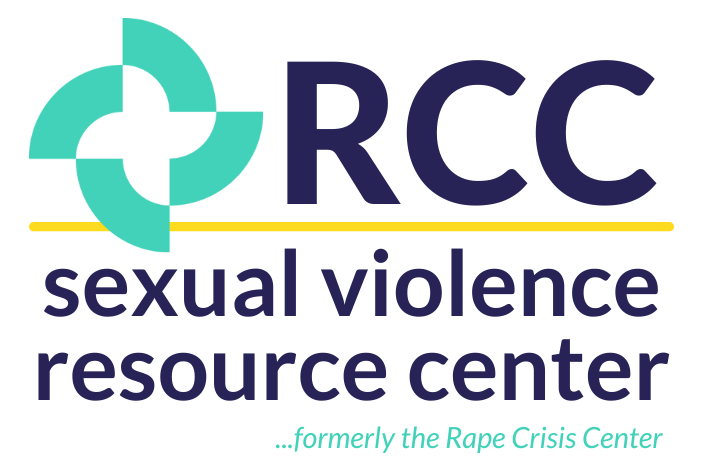
Survivor Services
RCC is dedicated to providing trauma informed, survivor-centered advocacy and support. Our team of Advocates are committed to empowering survivors and ensuring that we provide wrap-around services that address all needs, as well as the societal factors that contribute to inequitable outcomes.
All services are accessible by calling our helpline:
Emotional Support
Advocates provide FREE regular one-on-one emotional support to survivors of sexual violence and their support networks for people 12 years of age and older. Staff provide services with a deep understanding of the impacts of sexual violence, power and control dynamics, and trauma. Through this lens of trauma-informed care, compassion and experience, we are able to provide immediate emotional support that is crucial to the well-being of victims/survivors.
Call our helpline for scheduling emotional support with our advocates.
Survivor Booklet
This booklet was written to provide information about the process of reporting and prosecuting a sexual assault as it concerns the victim. Understanding how the system works and what options are available may help to make the decision easier.
Booklet for Support People of Survivors
This booklet was written to provide information and tools for best supporting a survivor of sexual violence.
Medical Advocacy
After an assault, victims/survivors may want medical attention, but that can sometimes seem overwhelming. Our trained advocates can be there to help. There are two main reasons survivors choose to go to the hospital:
Medical examination
Forensic evidence collection
You can choice to complete both, one or the other, or neither. If you choose to get evidence collection, you don’t have to use it right away or ever, you can make that decision a later date.
-
After a sexual assault, you may choose to get a medical exam to check on your physical health. A healthcare provider will be able to check for injuries, infections, and other possible effects of the assault, including many that might not be evident to you. You may also receive preventative antibiotics and/or emergency contraceptives if needed. You can get this exam through your regular channels (primary healthcare provider, community clinic, etc.), or you may choose to go to Meriter Hospital’s emergency room for an exam with a trained Sexual Assault Nurse Examiner.
Adults will NOT have to undergo evidence collection or report the assault to the police. For more information or to discuss your options, please call our helpline (608-251-7273). -
A medical forensic exam is recommended if you intend (or might eventually intend) to report the assault to the police. The Sexual Assault Nurse Examiner (SANE) Program can be accessed by going to the emergency room at Meriter Hospital. SANE nurses are specially trained to collect evidence (injuries, foreign DNA, etc.) as well as assess the physical health of assault victims.
-
Whether you choose to have evidence collected or just ask for a basic medical exam, here are some things you can expect:
• You may wait for the nurse in a private room.
• An RCC advocate will be called immediately to come offer support and guide you through the process. You may send them away at any time.
• You may also have a support person (a friend, family member, and/or an RCC advocate) with you during the exam.
• The nurse will explain everything they are doing step by step. You can opt out of any part of the exam at any point, or you may choose to stop the exam all together at any time.
• If a police officer is present at the hospital, you may choose whether or not to allow them into the exam room.
• If you choose to have evidence collected/report, the clothes you were wearing at the time of the assault will be held for evidence until your case is closed, so bring a change of clothes if possible.
Patients are almost never billed for a SANE visit. Please call our helpline for more information (608-251-7273).
Legal Advocacy
Many victims/survivors choose to engage with the legal system for various reasons following an assault. Navigating the legal system can be stressful, overwhelming, confusing and/or re-traumatizing. RCC is here to help! Our advocates can support and guide you with compassion and care through part or all of the following processes:
Reporting an assault to the police
Filing a temporary restraining order
Acting as a witness in a court case
Please note that we do not have lawyers on staff and cannot give legal advice, but are able to contract with outside lawyers when possible.
-
Any victim of sexual violence in Dane County has the right to be treated with respect and dignity regardless of gender, race, cultural background, age, sexual orientation, income, cognitive abilities, physical abilities, or sexual, medical, and mental health history.
Treating victims with respect and dignity requires that we acknowledge that sexual violence is wrong and that no one deserves to be, or asks to be, a victim of such violence, nor are victims responsible for the violence committed against them.
The Dane County Coordinated Community Response Team developed a Bill of Rights for sexual assault victims in our county. These standards are endorsed by a long list of human service providers, law enforcement officials, departments in the criminal justice system, health care providers, educational institutions, and community and government leaders.
Culturally Specific Services
-
Bilingual/bicultural advocates are available during business hours as well as available on-call to ensure 24/7 access to advocacy and crisis support for Spanish-speaking victims of sexual violence.
-
RCC’s La Línea is staffed by Spanish-speaking bilingual/bicultural advocates and on-call advocates for 24-hour care. La Línea: (608) 258-2567
-
Direct support to immigrant and/or undocumented victims of sexual violence facing deportation, including assistance in completing a U visa. For this work, we act as an information and referral resource. This is accomplished through our advocates developing referral-based relationships with attorneys.
-
Our Multicultural Victim Advocate provides crisis intervention services and case management to Black & African-American communities.
This position prioritizes providing culturally responsive forms of personal and systems advocacy that are informed by the needs of the community.



